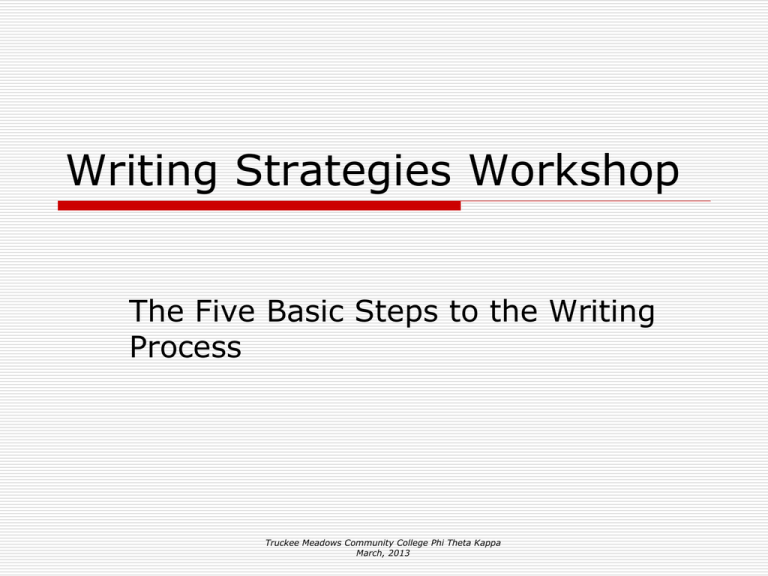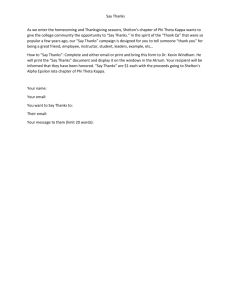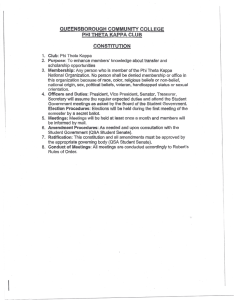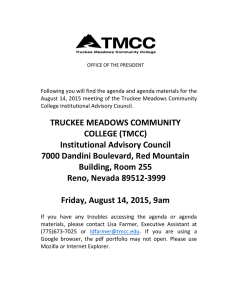Writing Strategies Workshop The Five Basic Steps to the Writing Process
advertisement

Writing Strategies Workshop The Five Basic Steps to the Writing Process Truckee Meadows Community College Phi Theta Kappa March, 2013 1. Brainstorming Ideas Put your ideas down on paper! Several ways to do this: Create a List – used for ideas that may not be separated into categories Cluster – ideas separated into categories Jot Down Ideas – less organized than lists but with same purpose Venn Diagrams – great for compare/contrast papers Other – What is your preferred method of brainstorming? Truckee Meadows Community College Phi Theta Kappa March, 2013 2. Organizing and Outlining Thoughts Create a “working thesis.” This should answer in one sentence the question your paper explores; it should summarize the main idea of your paper. Group similar ideas together These will fuel your body paragraphs Write topic sentences for each group of ideas Truckee Meadows Community College Phi Theta Kappa March, 2013 3. Writing Body Paragraphs Look at each topic sentence you created and determine which of the nine rhetorical modes (types of paragraphs) should be used: Description: Using the five senses to describe something. Narration: Using stories/anecdotes to relate the topic to the reader. Process Analysis: Analyzing how something works or explaining a process. Illustration and Example: Giving examples to illustrate or prove something about the topic. Division and/or Classification: Categorizing the topic into different groups or classifications. Truckee Meadows Community College Phi Theta Kappa March, 2013 3. Writing Body Paragraphs (Cont’d) Compare and Contrast: Showing similarities/differences between subjects and related topics. Definition: Clarifying a term or phenomenon through defining it. Analyzing Cause and Effect: Discussing the causes and effects of an event or phenomenon. Analyzing Parts or Categories: Dividing a subject into classifications for analysis. What type of essay you are writing determines which of the nine modes you will use. Any essay may use more than one of these modes. The modes give purpose to your essay and help you effectively make your point. Truckee Meadows Community College Phi Theta Kappa March, 2013 4. Writing the Introduction, Conclusion, and Title Continuously reread your thesis and make sure it is supported throughout your essay. Change it if necessary to ensure it is supported. Your introduction should introduce your topic, articulate background information on the subject, and end with your strong thesis. Your conclusion should restate your main argument (thesis), summarize your body paragraphs, and end with an overall significance or a call to action (depending on the type of essay). Your title should be interesting and relate to your subject; it can be witty (depending on the subject) and should draw the reader in. Truckee Meadows Community College Phi Theta Kappa March, 2013 Road Trip Analogy A well written essay is like a road trip with your friends. Your introduction is like the road map; it shows the reader where you will be going. Your thesis is the purpose of the trip. Your body paragraphs are the actual trip itself and what happens on the road. Your conclusion is the slideshow you have afterwards; it shows the reader briefly where you’ve been. Truckee Meadows Community College Phi Theta Kappa March, 2013 5. Proofreading/Editing and Revising Steps of editing: “Global” editing – “Does my essay make sense?” Go through and change the location of paragraphs/parts to ensure the paper makes logical sense and the reader can easily follow your argument. Write transition statements to link paragraphs to each other. Sentence-level editing: Make sure you are using the correct grammar/punctuation and word choice. Truckee Meadows Community College Phi Theta Kappa March, 2013 Summary/Final thoughts With the five steps to writing, you are well on your way to writing a great paper. Don’t get overwhelmed by the overall task of writing an essay; take each step by itself and before you know it, you’ll be finished. Great essays convey the writer’s passion so find a way to be passionate about your subject! Truckee Meadows Community College Phi Theta Kappa March, 2013




